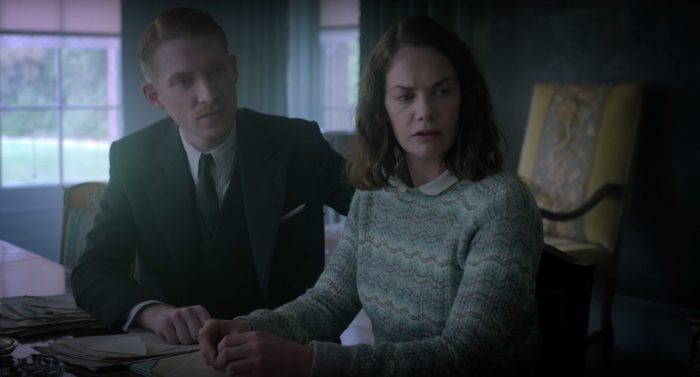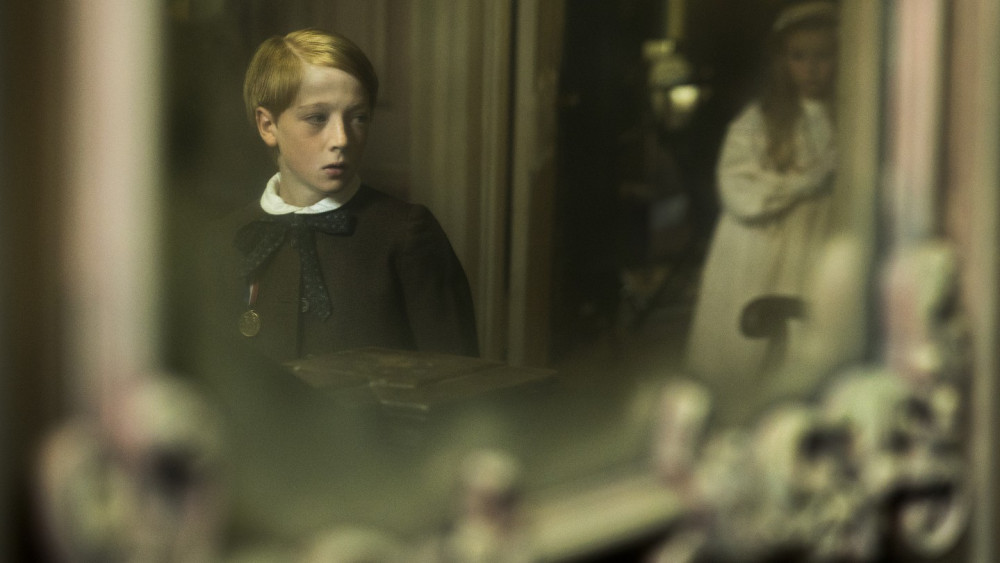The Little Stranger
The Little Stranger, 2018, 4 stars
Haunted by class
Supernatural drama deconstructs collapse of gentry
From The Orlando Weekly, September 4, 2018
When it was announced earlier this year that Downton Abbey would be getting a cinematic reboot, some fans of the British television show hoped the new movie would pick up not in the 1920s (when the show left off), but 20 years on. That would allow for an even more profound commentary on the collapse of British country estates and the class structure that fed them.
That is unlikely, however, as the film will probably begin where the series ended. But if you’re still longing for a glimpse of English manor houses in the late 1940s, you can now view them in all their faded glory through the lens of Irish director Lenny Abrahamson (Room) and his new film, The Little Stranger.
Lovingly adapted from the 2009 novel by Sarah Walters, Abrahamson’s movie concerns a doctor named Faraday (Domhnall Gleeson), who appears resigned to his middle-class station and middle-aged bachelorhood in the rural English county of Warwickshire. Though he’s aware that he could be leading a more exciting and professionally fulfilling life in London, this seemingly mild-mannered, unassuming gentleman nevertheless has a strange sense that his destiny lies in his native village. He knows which side his milquetoast is buttered.
But having grown up in the shadow of Hundreds Hall, the village’s grandest manor, Faraday has always been acutely aware of his place, or lack thereof, in society. Indeed, his strong feelings for the house – which range from love to resentment – are deep-rooted thanks to his late mother, who briefly worked there. So when Faraday is called to the manor to treat a servant (Liv Hill) who has fallen ill, he is more than pleased to strike up a friendship with the family, particularly with Caroline (Ruth Wilson), who is close to his age and also single.
Faraday learns, however, that time has not been kind to Hundreds when he asks Caroline’s brother, Roderick (Will Poulter), whether it’s “one of the maids” who is sick. Rendered incredulous at Faraday’s remark, Roderick implies that the manor struggles to keep just one maid. But Faraday is still right chuffed to be a part of the tiny household and seems to take pride in caring for Roderick – who was badly injured in World War II – and the siblings’ aging mother (Charlotte Rampling).
 “This house works on people,” the mother tells Faraday, foreshadowing events of the film’s final act. It’s a treat to watch those events play out in deliberate, mysterious fashion, and it’s even more fascinating to see how Lucinda Coxon’s screenplay suffuses supernatural elements in what is otherwise a profound and unique commentary on post-war English society. For this is indeed a haunted house filled with haunted characters, though perhaps not in the way you expect. Eschewing jump scares and cheap thrills, The Little Stranger slowly reveals itself. But just when you think you might have things figured out, it leaves you guessing.
“This house works on people,” the mother tells Faraday, foreshadowing events of the film’s final act. It’s a treat to watch those events play out in deliberate, mysterious fashion, and it’s even more fascinating to see how Lucinda Coxon’s screenplay suffuses supernatural elements in what is otherwise a profound and unique commentary on post-war English society. For this is indeed a haunted house filled with haunted characters, though perhaps not in the way you expect. Eschewing jump scares and cheap thrills, The Little Stranger slowly reveals itself. But just when you think you might have things figured out, it leaves you guessing.
More importantly, this unexpectedly deep film leaves you thinking – not just about the destiny of its characters but the destiny of England. For just as Faraday believes that “a man cannot outrun himself,” so too does Hundreds Hall and its occupants believe they are doomed to an existence that has become not just unsustainable but malevolent.
The movie asks a lot of its audience in the second half, when its momentum sags slightly. But the atmospheric cinematography and strong performances more than make up for structural flaws. In fact, this is arguably Gleeson’s most sensitive, accomplished performance since 2012’s Anna Karenina. Wilson (Gleeson’s co-star in Anna Karenina) and Rampling (45 Years) are even better, while Poulter (We’re the Millers) and Hill (Three Girls) are both engrossing.
Hereditary – another excellent but far more shocking, graphic thriller from this year – establishes its mood early with disturbing violence involving a child, and The Little Stranger does the same when the family dog unexpectedly mauls a girl. Following the attack, Caroline realizes she must surrender her beloved pet, and Abrahamson uses that moment of grief to color the world of not just his characters but all wealthy, land-owning Britons of that era.
“Everything else is gone,” Caroline laments. “Why not take him too?”
© 2018 MeierMovies, LLC
